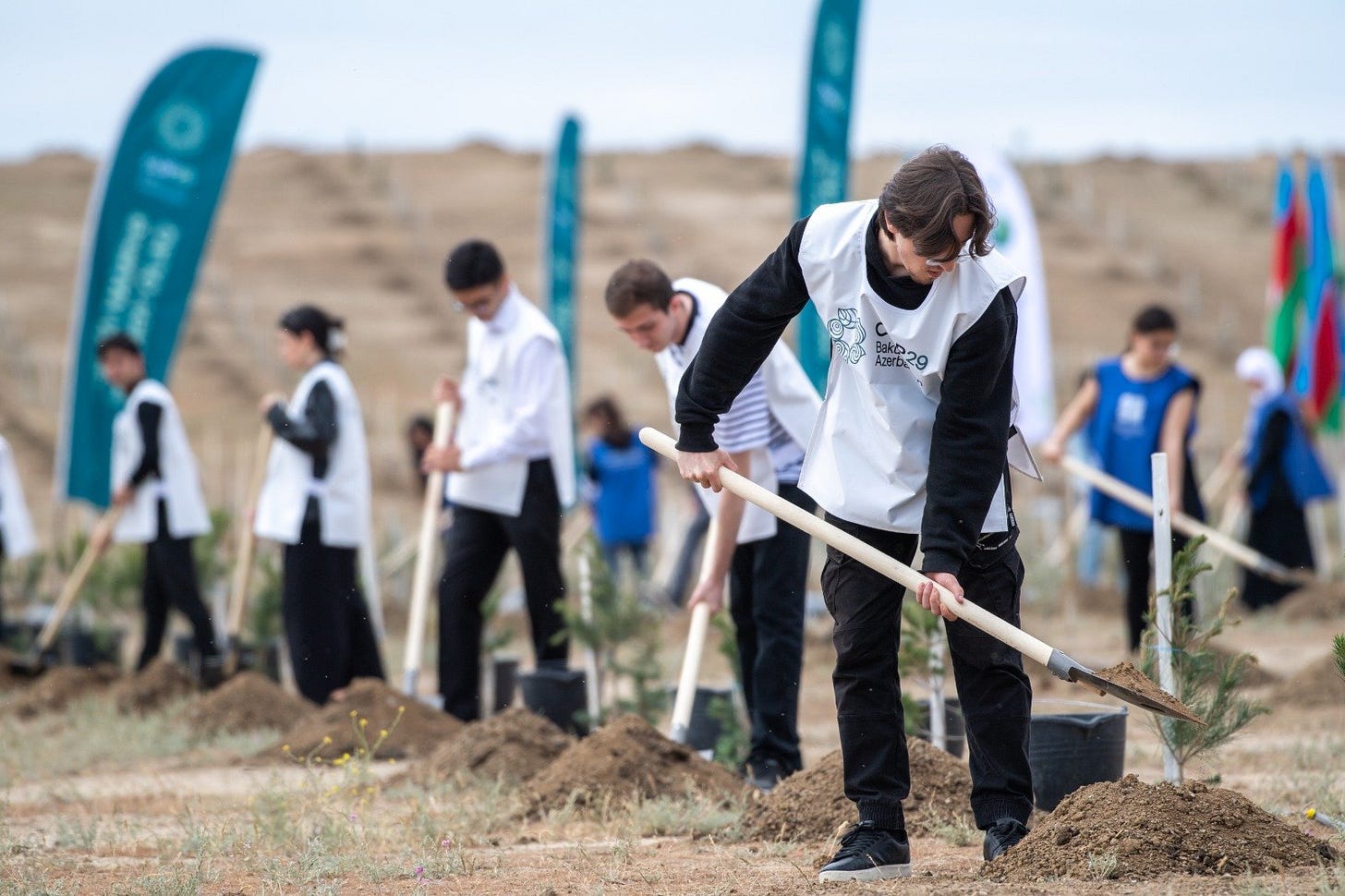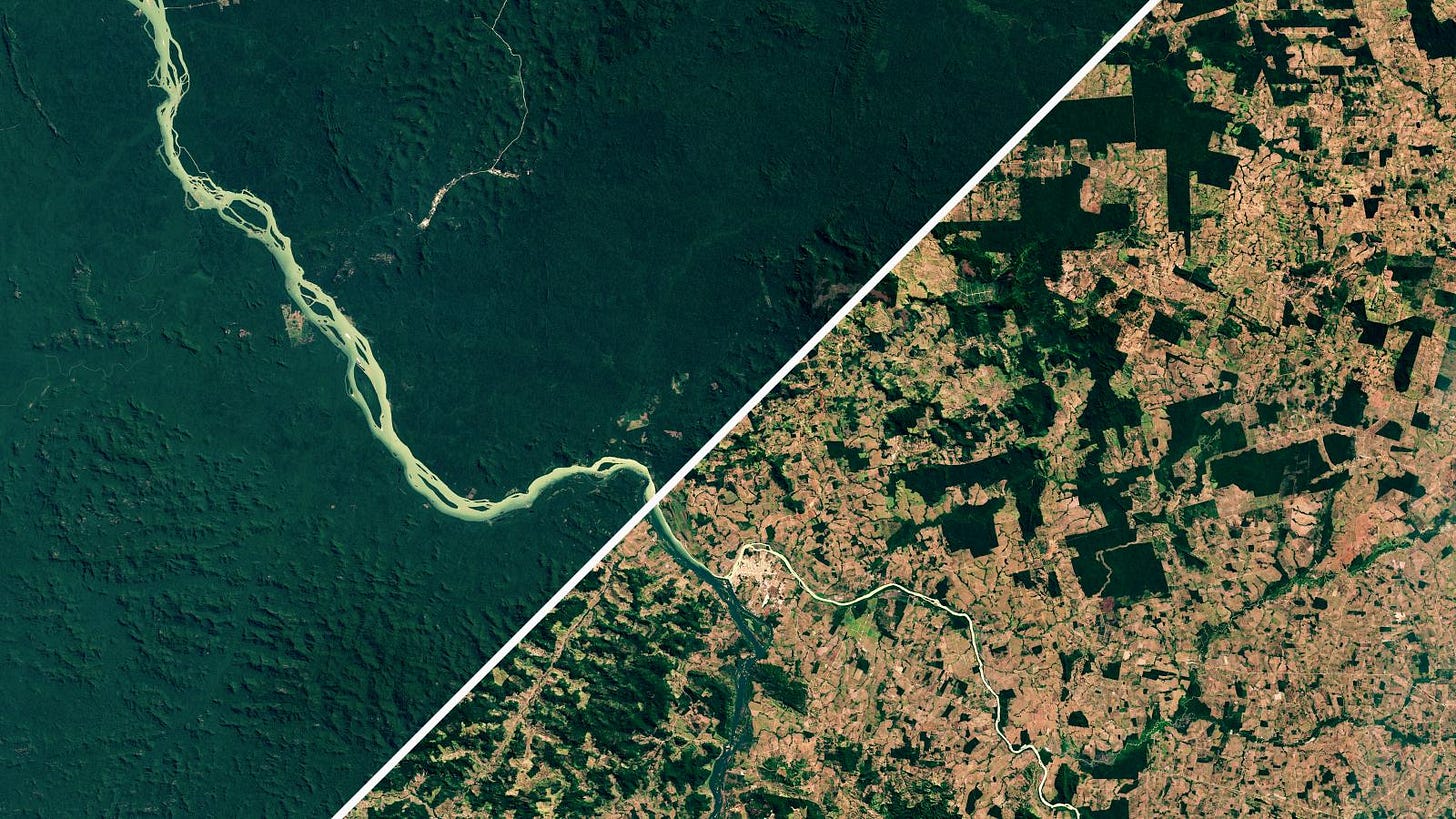The criminal irrelevancy of COP
As COP29 closes, is there any justification for yet another pointless climate change conference next year in Brazil?
When the head of the host country’s COP29 team is caught negotiating fossil fuel deals ahead of the conference because 90% of the country’s exports are fossil fuels… When the laughably outrageous greenwashing ambitions of the petrostate are overshadowed by its recent ethnic cleansing campaign of 120,000 Armenians from their ancient homeland… And when Azerbaijan “is among a tiny group of countries that has actually weakened its climate target”—you might be tuning into the rivetting season finale of 2024.
It’s been 29 years that heads of state and government officials have been meeting to find common solutions for “climate action.” In a signal that might be interpreted as the irrelevancy of the endeavor, this year’s UN Climate Conference was plagued by a dramatic drop in attendance by heads of state, with only around 70 in attendance compared to 150 last year.
Leaders of most of the world’s biggest polluters did not come to Baku, including the US’s Biden, France’s Emmanuel Macron and India’s Narendra Modi.
In a short promotional video, the head of COP29 calls for making “COP29 count” by “phasing out fossil fuels” and securing “climate finance” (what is that exactly?) for poor countries.
And yet, the president of COP29’s host country told the conference audience that oil and gas are a “gift of God” and plans to expand gas production by up to a third over the next decade.
The key outcome document from COP28 in 2023 (called the Global Stocktake) called on countries to start “transitioning away from fossil fuels.”
But the UN’s choice of host country for this 29th edition has areas like the “Apsheron Peninsula (including Baku) and the Caspian Sea” which are among the “ecologically most devastated area in the world … [with] severe air, soil, and water pollution,” oil spills, and “untreated municipal and industrial wastewater.”
The contradiction between the stated goals of the conference and the goals of its host would be laughable if it weren’t for the staggering level of state-facilitated corruption going on behind the scenes of the 2-week conference.
The ruling clan of Azerbaijan—the Aliyev’s—preside over a nation that has been described as “the most authoritarian country ever to host a COP” according to a ranking by Freedom House.
The Aliyev family and their allies are profiting handsomely from hosting COP29. Key contracts, such as a $5.2 million no-bid deal for the luxurious Sea Breeze Resort owned by Aliyev’s former son-in-law, reveal a clear overlap between personal enrichment and government policy. Official COP29 partners, including companies like PASHA Holding and SOCAR, are directly tied to the ruling clan, raising concerns over conflicts of interest and the misuse of international platforms for self-serving agendas.
Azerbaijan’s heavy reliance on oil and gas exports underscores the contradictions at the heart of COP29. The country’s economic lifeblood is fossil fuels, and its national oil company, SOCAR, is not only a dominant player in the economy but also an official partner of the conference (through subsidiary SOCAR Green).
This juxtaposition highlights the painful absurdity of a climate summit ostensibly aimed at curbing carbon emissions being co-opted by one of the world’s top fossil fuel producers.
Global emissions, still rising
The stated goals of the COP conferences are to coerce countries to “limit climate change” through the following principle objectives: Develop renewable energy solutions, phase out fossil fuels, and reduce greenhouse gas emissions.
As we have seen, the audacity of hosting the COP in Azerbaijan (the 3rd petrostate in a row to host the conference; COP27: Egypt, COP28: UAE) wholely undermines the commitment to the first two objectives. The third objective is undermined by data from 2023.
In 2023, global greenhouse gas emissions reached 57.1 gigatons of CO₂ equivalent, marking a 1.3% increase from 2022 and significantly surpassing the average growth rate of 0.8% per year seen from 2010 to 2019.
China was the largest contributor to this rise, with its emissions climbing by 5.2%, followed closely by India, which experienced a 6.1% increase in emissions.
The rate of CO₂ emissions growth year on year has never been higher since the start of the COPs.
CO₂ vs pollution
The almost exclusive focus on CO₂ emissions as the main driver of “climate change” and “environmental degradation” obfuscates the major issue of global pollution. Pollution features in the COP conferences but is often secondary to the primary focus on greenhouse gas emissions and “climate change mitigation.”
What good is just reducing CO₂ emissions while microplastics and contaminents increasingly show up in our global water supplies, air particulates cause deadly diseases, heavy metals poison people and the planet, pesticides, herbicides, and industrial spills contaminate our soils, persistent organic pollutants (POPs) proliferate in our environments…
Poor air quality, contaminated water, and toxic waste exposure are causing millions of premature deaths annually. According to the WHO, air pollution linked to respiratory and cardiovascular diseases, such as asthma, chronic obstructive pulmonary disease (COPD), and heart attacks is responsible for 7 million premature deaths annually, making it one of the leading causes of death worldwide.
Heavy metals (lead, mercury) can cause neurological damage, developmental delays in children, and kidney disease. Persistent organic pollutants (POPs) are carcinogenic and disrupt hormonal systems.
While CO₂ reductions are crucial, the elusive and politicized nature of these agreements often leads to incremental progress at best, leaving pressing issues like pollution underfunded and neglected. The Paris Agreement's non-binding nature allows countries to delay or avoid meaningful action on emissions. Many pledges involve distant targets (e.g., net-zero by 2050) that are often undermined by current practices, such as ongoing fossil fuel subsidies or the reliance on carbon offsets.
Climate dollars
Today is the final day of COP29 and this year’s major theme was “climate finance”—or securing commitments from wealthier countries to finance “climate initiatives” in poorer countries. World governments represented at the meeting are tasked with agreeing a plan that would see rich nations pledge to give hundreds of billions of dollars to help poorer countries grapple with the worsening impacts of climate change.
This robin-hood style policy has been in place since the 2015 Paris Agreement. Developed countries pledged $100 billion annually by 2020 to help developing nations mitigate and adapt to climate change. However, this target was repeatedly missed, and actual funds delivered often fell short of the amounts promised.
COP29’s goal is a total commitment of USD 1.3 trillion.
Unsurprisingly, as of publication, no agreement has been reached.
A new draft of a deal released Friday afternoon pledged $250 billion by 2035.
UN Secretary-General Antonio Guterres returned to Baku from a G20 meeting in Brazil on Thursday, calling for a major push to get a deal and warning that “failure is not an option.”
But failure is the best term to describe the COPs—failure to secure emissions reductions particularly from major emitters, failure to avoid lobbying pressure from fossil fuel companies and high-carbon industries in sponsoring or influencing COP events, failure to meet the agreed climate finance goals, failure to secure a global agreement to phase out fossil fuels or eliminate subsidies for fossil fuel industries, failure to stop host countries from expanding fossil fuel projects while hosting the climate summits, failure to keep the planet’s temperature rise to below the agreed 2.0 C.
But not to worry, it’ll all be solved at COP30.
Mission undermined
The COP29’s hosting by Azerbaijan encapsulates the UNFCCC’s descent into “criminal irrelevance,” where countries and corporations promote token environmental initiatives while continuing unsustainable practices. By enabling corrupt regimes to exploit its platform, the organization undermines its mission and betrays the initiatives it porports to serve.
These summits are expensive networking events that benefit powerful stakeholders while sidelining substantive policy reforms. The spectacle of tree-planting ceremonies and lavish accommodations at COP29 epitomizes the performative approach to addressing climate issues.
Thankfully the volunteers planted a few dozen trees, since next year’s gathering to celebrate 30 years of vague, unenforcable environmental commitments will see the host country shift from a petrostate to Amazon rainforest deforestor extraordinaire, Brazil.






